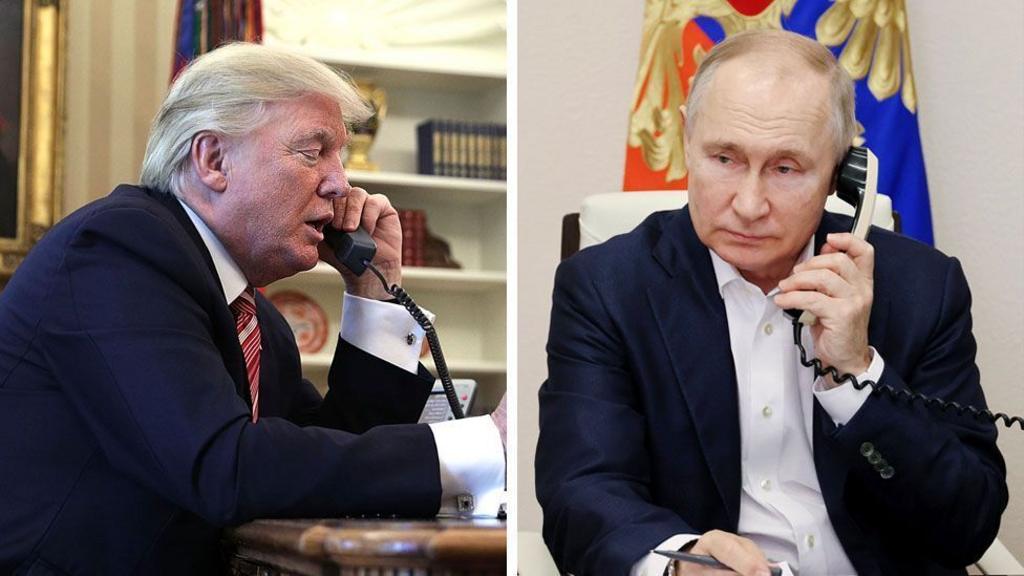U.S. President Donald Trump has reported “great progress” following a phone conversation with Russian President Vladimir Putin on Thursday, stating the two leaders agreed to hold face-to-face discussions in Hungary.
Trump described the call, their first since mid-August, as “very productive,” adding that teams from Washington and Moscow are scheduled to convene next week.
While Trump did not specify a date for his meeting with Putin in Budapest, the Kremlin announced that preparations for the summit would commence “immediately” following the “extremely frank and trustful” exchange.
These talks occurred a day before Ukrainian President Zelensky’s planned visit to the White House, as Trump considers providing Ukraine with Tomahawk missiles capable of reaching targets deep within Russia.
Upon arriving in the U.S., Zelensky remarked that Moscow was “rushing to resume dialogue as soon as it hears about Tomahawks.”
In a post on his Truth Social platform after the call, Trump noted that he and Putin “spent a great deal of time talking about Trade between Russia and the United States when the War with Ukraine is over.”
He indicated that “high level advisors” from both countries would meet at an undisclosed location next week, with Secretary of State Marco Rubio leading the American delegation.
Trump also stated he would brief Zelensky on his discussions with Putin on Friday, adding, “I believe great progress was made with today’s telephone conversation.”
He later informed reporters that he anticipates meeting with Putin “within two weeks.”
When questioned about the possibility of supplying Ukraine with the missiles after his call with Putin, Trump responded that “we can’t deplete” the U.S. stockpile of Tomahawks, adding “we need them too… so I don’t know what we can do about that.”
Ukraine’s ambassador to the U.S., Olga Stefanishyna, stated that Russia’s overnight strikes on Ukraine “hours before” Putin’s call with Trump “exposes Moscow’s real attitude toward peace.”
In a statement to the BBC’s U.S. partner CBS, she added, “These assaults show that Moscow’s strategy is one of terror and exhaustion. The only effective response is pressure – through tougher sanctions, reinforced air defense, and the supply of long-range capabilities.”
Hungarian Prime Minister Viktor Orban posted on X that the planned Budapest meeting was “great news for the peace-loving people of the world.”
Earlier, he also stated: “Peace requires patience, strength, and humility. Europe must shift its stance. Instead of arrogance and fanning the flames of endless war, we need negotiations with Russia. Only dialogue can bring peace to our continent.”
Trump has adopted a firmer stance towards Putin regarding the Ukraine war since a face-to-face summit in Alaska in August failed to yield a significant breakthrough in attempts to broker a peace agreement.
The two leaders met on U.S. soil on August 15 for a summit that the U.S. president hoped would persuade the Russian president to engage in comprehensive peace negotiations to end the war in Ukraine. Russia launched its full-scale invasion of Ukraine in February 2022.
They spoke again days later when Trump interrupted a meeting with Zelensky and European leaders to call Putin.
Since then, neither the White House nor the Kremlin has publicly confirmed any communications between the two.
During his presidential election campaign, Trump claimed he would be able to end the war in Ukraine within days but has since admitted resolving the conflict has been more challenging than any he has been involved in since returning to power.
Trump had been perceived as more sympathetic to Russia than his predecessor Joe Biden, and strained relations with Zelensky culminated on February 28 when he and Vice-President JD Vance rebuked the Ukrainian president in the Oval Office on live television.
However, public relations with Zelensky have significantly improved in recent months.
In September, Trump signaled a major shift in his view of the conflict, saying he believed Kyiv could “win all of Ukraine back in its original form,” a stark contrast to his public calls for Kyiv to cede territory occupied by Russia.
During Zelensky’s upcoming visit to Washington on Friday, his third since January, the subject of Tomahawk missiles is likely to be high on the agenda.
Zelensky has urged the U.S. to provide Ukraine with the advanced missiles, which have a range of 2,500 km (1,500 miles).
Asked earlier this week if he was considering giving Ukraine the missiles, he said: “We’ll see… I may.”
In late July, Trump set Putin a deadline of less than a fortnight to agree to a ceasefire or face sweeping sanctions, including measures against countries which still trade with Russia.
But he did not follow through with the threat after Putin agreed to meet Trump in Alaska, which the U.S. president hailed as a significant diplomatic success at the time, despite it not producing any tangible outcome.
Earlier on Thursday, India’s foreign ministry cast doubt on a claim made by Trump a day earlier saying Indian Prime Minister Narendra Modi had agreed to stop purchasing Russian oil.
An Indian government spokesman said he was “not aware of any conversation between the two leaders” taking place the previous day, after Trump said Modi had assured him purchases would stop “within a short period of time”.
The U.S. has pushed for countries – in particular India, China and Nato members – to stop buying Russian energy in an effort to increase economic pressure on the Kremlin. Zelensky has also repeatedly echoed those calls.
The president has defended the fee and said the programme – used widely by US tech companies – was being abused
China holds a near-monopoly in the processing of the elements crucial for making everything from smartphones to fighter jets.
Bolton is the third of the US president’s political opponents to face charges in recent weeks.
The Paris-inspired proposed monument in Washington DC is meant to commemorate the US 250th anniversary.
At least 27 people have been killed in US strikes on alleged “narco-boats” in the Caribbean.

